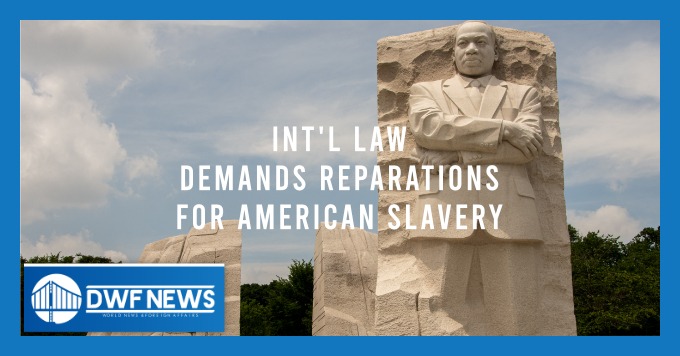The ban on enslavement is a ‘peremptory norm,’ meaning that it can be enforced retroactively.
Written by Arif Hyder Ali
Attorney | Transactional and Trade Law
June 22, 2020
Article originally published by Wall Street Journal
After the death of George Floyd, BET co-founder Robert Johnson argued that “now is the time” for the U.S. to pay $14 trillion in reparations to American descendants of African slaves. He’s right. But while the issue in the U.S. is seen largely as a domestic affair, international law creates an unequivocal basis for reparations.
The failure of successive U.S. governments to pay reparations paved the way for the Trump administration’s impunity. It has meant that the intergenerational trauma inflicted by the slave trade over centuries has never healed, but instead has been incorporated into many of America’s most vital institutions.
Some argue that because slavery was legal during much of the time it was practiced in the U.S., there can be no case for reparations. But the U.S. is bound by international law and must be guided by the precedent set by many other countries that have recognized reparations as a means to redress injustice.
Moreover, the prohibition against slavery has now achieved jus cogens—a peremptory norm, from which no derogation is permitted. This is the highest legal status in international law, and it means retroactive responsibility may be imposed on those who violated that norm. This is how the Nazis were prosecuted at Nuremberg: retroactively—for the jus cogens of crimes against humanity. On that basis alone, the U.S. may be held legally responsible for the historical enslavement of Africans and the consequences for their descendants . . .
What is World Federalism?
World Federal Government (WFG)
Original Publisher
Wall Street JournalArif H. Ali serves as lead attorney or trial counsel in international commercial and investment arbitrations under the procedural rules of all major arbitral institutions including the CRCICA, DIAC, ICC, ICSID, LCIA, ICDR, DIAC, and the UNCITRAL. Mr. Ali has litigated a broad spectrum of disputes across a wide range of industries including oil and gas, mining, infrastructure development, hospitality, and technology. Mr. Ali has particular experience advising on issues involving foreign direct investments, privatization, oil and gas pipeline construction, mining concessions, natural resource exploitation projects and contracts, the development and operation of tourism and hospitality projects, domain names, and patents and trademarks.
Related Articles
LIST of Articles DWF NEWS 5/28/25
Children, Civilians Burned Alive as Israeli Warplanes Target School, Home in Gaza Palestine Chronicle staff 'Can't Remain Silent' on Jewish Atrocities: Malaysian Foreign Minister Says at ASEAN Foreign Ministers' Meeting Aamir Latif Anadolu Agency ...
LIST of Articles for DWF NEWS 5/14/25
Should "Israel" Be Declared A Terrorist Entity? Kevin Barrett Israel Is Spiraling Ori Goldberg The Nation 'Our Position on Palestine Is Not Fringe' Janine Jackson FAIR Latecomers starting to join PEOPLE OF CONSCIENCE Multiple Western Press Outlets Have...
List of Articles for DWF NEWS 4/30/25
PEOPLE OF CONSCIENCE absent among WASP & Zionist elites Imperial Cowardice: Gaza & the Moral Collapse of the American Elite Mohamed El Mokhtar The Palestine Chronicle Where is the Arab Street? Asad Abukhalil Consortium News Gaza exposes the rot of...
Solving Global Problems
We can work together to make the world better

